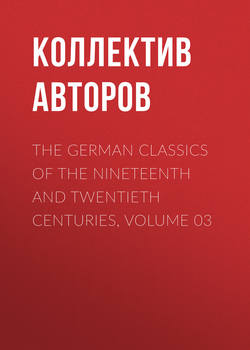Читать книгу The German Classics of the Nineteenth and Twentieth Centuries, Volume 03 - Коллектив авторов, Ю. Д. Земенков, Koostaja: Ajakiri New Scientist - Страница 3
POEMS
TO THE IDEAL (1795)
ОглавлениеThen wilt thou, with thy fancies holy—
Wilt thou, faithless, fly from me?
With thy joy, thy melancholy,
Wilt thou thus relentless flee?
O Golden Time, O Human May,
Can nothing, Fleet One, thee restraint?
Must thy sweet river glide away
Into the eternal Ocean Main?
The suns serene are lost and vanish'd
That wont the path of youth to gild,
And all the fair Ideals banish'd
From that wild heart they whilome fill'd.
Gone the divine and sweet believing
In dreams which Heaven itself unfurl'd!
What godlike shapes have years bereaving
Swept from this real work-day world!
As once, with tearful passion fired,
The Cyprian Sculptor clasp'd the stone,
Till the cold cheeks, delight-inspired,
Blush'd—to sweet life the marble grown:
So youth's desire for Nature!—round
The Statue so my arms I wreathed,
Till warmth and life in mine it found,
And breath that poets breathe—it breathed;
With my own burning thoughts it burn'd;—
Its silence stirr'd to speech divine;—
Its lips my glowing kiss return'd—
Its heart in beating answer'd mine!
How fair was then the flower—the tree!—
How silver-sweet the fountain's fall!
The soulless had a soul to me!
My life its own life lent to all!
The Universe of things seem'd swelling
The panting heart to burst its bound,
And wandering Fancy found a dwelling
In every shape, thought, deed, and sound.
Germ'd in the mystic buds, reposing,
A whole creation slumbered mute,
Alas, when from the buds unclosing,
How scant and blighted sprung the fruit!
How happy in his dreaming error,
His own gay valor for his wing,
Of not one care as yet in terror
Did Youth upon his journey spring;
Till floods of balm, through air's dominion,
Bore upward to the faintest star—
For never aught to that bright pinion
Could dwell too high, or spread too far.
Though laden with delight, how lightly
The wanderer heavenward still could soar,
And aye the ways of life how brightly
The airy Pageant danced before!
Love, showering gifts (life's sweetest) down,
Fortune, with golden garlands gay,
And Fame, with starbeams for a crown,
And Truth, whose dwelling is the Day.
Ah! midway soon lost evermore,
Afar the blithe companions stray;
In vain their faithless steps explore,
As one by one, they glide away.
Fleet Fortune was the first escaper—
The thirst for wisdom linger'd yet;
But doubts with many a gloomy vapor
The sun-shape of the Truth beset!
The holy crown which Fame was wreathing,
Behold! the mean man's temples wore,
And, but for one short spring-day breathing,
Bloom'd Love—the Beautiful—no more!
And ever stiller yet, and ever
The barren path more lonely lay,
Till scarce from waning Hope could quiver
A glance along the gloomy way.
Who, loving, lingered yet to guide me,
When all her boon companions fled,
Who stands consoling yet beside me,
And follows to the House of Dread?
Thine FRIENDSHIP—thine the hand so tender,
Thine the balm dropping on the wound,
Thy task the load more lightly to render—
O! earliest sought and soonest found!
And Thou, so pleased, with her uniting,
To charm the soul-storm into peace,
Sweet TOIL, in toil itself delighting,
That more it labored, less could cease;
Tho' but by grains thou aid'st the pile
The vast Eternity uprears,
At least thou strik'st from Time the while
Life's debt—the minutes, days and years.[3]
* * * * *
